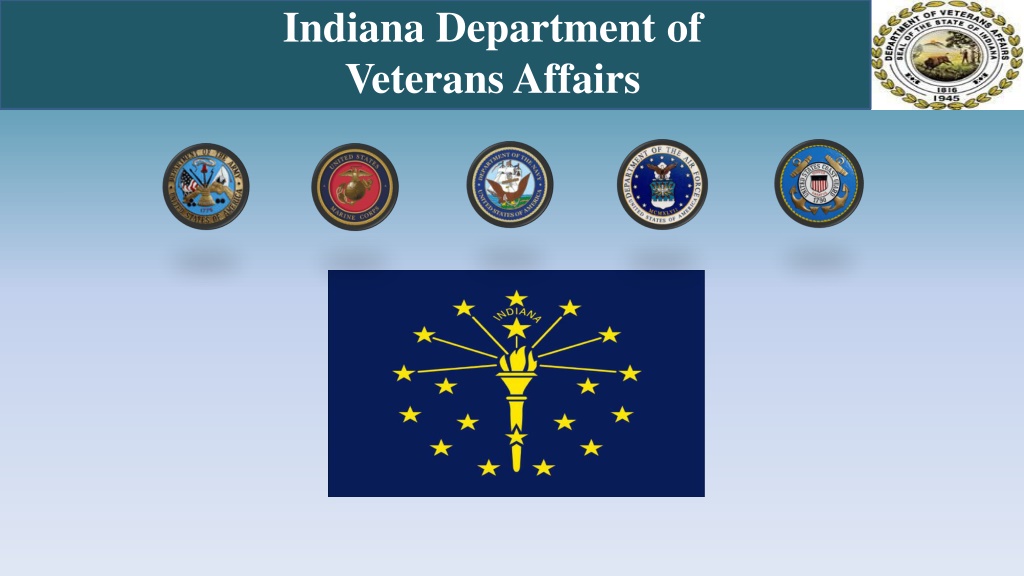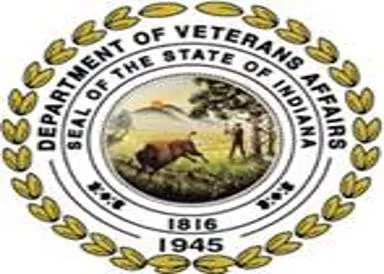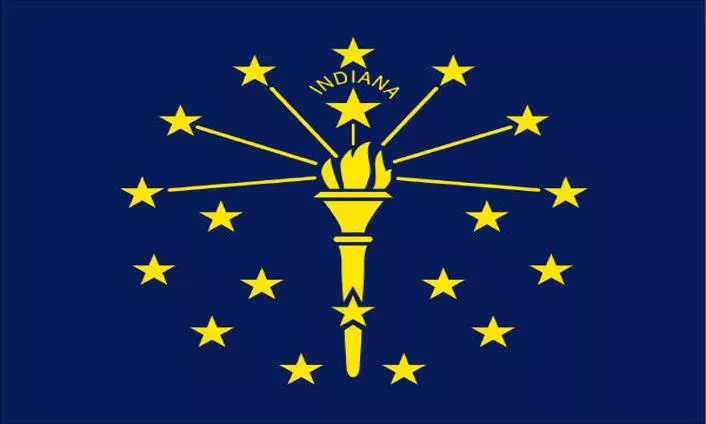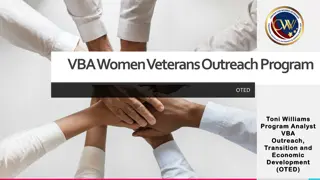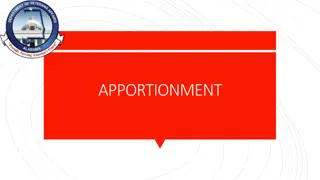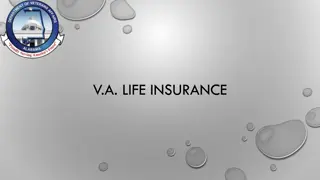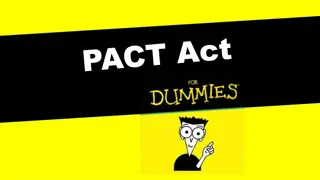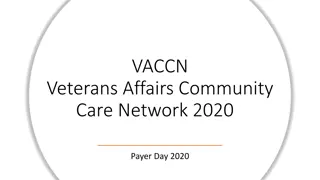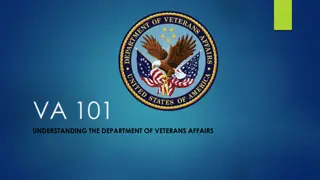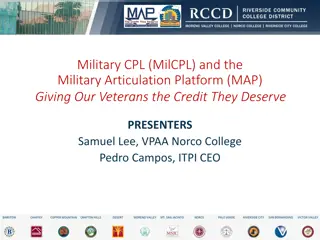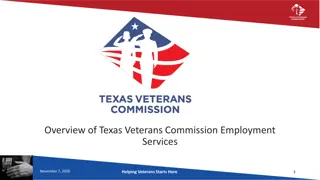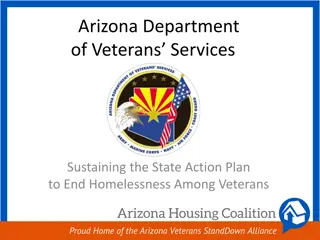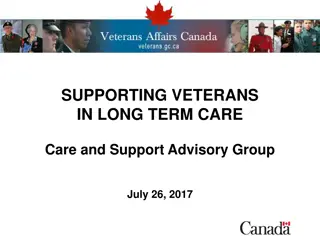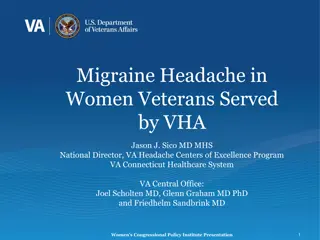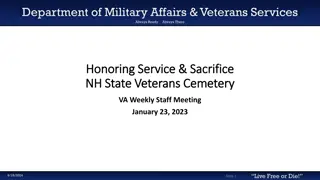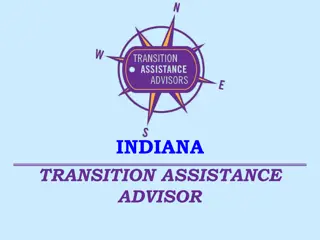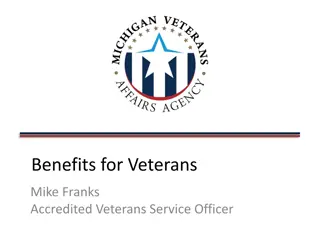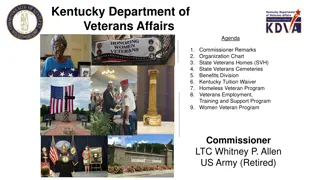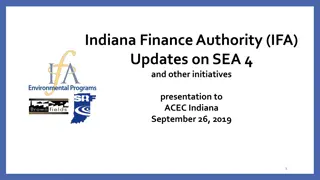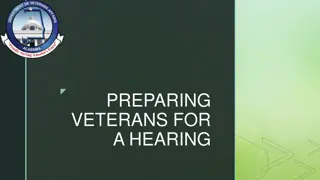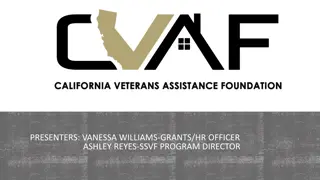Indiana Department of Veterans Affairs
In-depth guidelines and training on ethics and conduct for Veteran Service Officers and employees of the Indiana Department of Veterans Affairs, covering topics such as bribery, conflicts of interest, gifts, and more. Importance of completing ethics training annually to maintain sharpness and avoid complacency in daily activities.
Download Presentation

Please find below an Image/Link to download the presentation.
The content on the website is provided AS IS for your information and personal use only. It may not be sold, licensed, or shared on other websites without obtaining consent from the author. Download presentation by click this link. If you encounter any issues during the download, it is possible that the publisher has removed the file from their server.
E N D
Presentation Transcript
Indiana Department of Veterans Affairs
Indiana Department of Veterans Affairs Ethics Training
TOPICS Additional Compensation Bribery Conflicts of Interest Gifts Political Activity Use of Government Property Ghost Employment Confidentiality
Ethics Training All Veteran service officers and employees of that office should complete ethics training every year. This is many times not required this often, but in our line of work it is best to stay sharp and not become complacent in our daily activities.
Additional Compensation Additional Money, Money, Money Veteran Service Officers and employees in that office should not solicit or accept compensation for the performance of official duties other than provided for by law. Don't accept additional money for doing your job (excluding your salary).
Bribery Psst, do I got a sweet deal for you , it s called Bribery A Veteran Service Officer and employees of that office should not receive pay or offer to pay any money or favors for the performance of a government official s duties except as permitted by law.
Conflicts of Interest (Contracts) The Rule: 42 IAC 1-5-7 Conflict of Interests; Contracts Contracting restrictions are set forth in IC 4-2-6-10.5. a.Subject to subsection (b), a state officer, an employee, or a special state appointee may not knowingly have a financial interest in a contract made by an agency. b.The prohibition in subsection (a) does not apply to a state officer, an employee, or a special state appointee who: 1.does not participate in or have contracting responsibility for the contracting agency; and 2.files a written statement with the inspector general before the state officer, employee, or special state appointee executes the contract with the state agency. Do not enter into any government contract which might financially benefit you.
Conflicts of Interest (Decisions and Voting) Conflicts of Interest; Decisions and Voting decision or vote, that the VSO or employee of that office has a financial or personal interest in the outcome of the matter: As a Veteran Service Officer, or an employee of that office, you should not participate in any Examples you may encounter as a Veteran Service Officer and should avoid are; 1. Processing a state or federal benefit application for a close relative or spouse. 2. Approving your own state benefit application. Bottom line is, if you have to ask yourself should I be doing this ? You probably shouldn t.
Gifts & etc. A VSO or employee of that office who has a business relationship with employee's of other agencies should not provide any: - Gifts , favors, services, entertainment, food, drink, or pay any expenses for them. Additionally you should not accept any of the above mentioned items for doing your job.
Political Activity This section does not prohibit you from engaging in such activity when not on duty. A VSO or an employee of that office should not engage in political activity including solicitation of political contributions from: another employee or special county appointee; or any other person; when on duty or acting in an official capacity. As a VSO or employee of that office you should not solicit political contributions at any time from: persons whom you have a business relationship with or directly supervise VSOs or employees of that office who have purchasing or procurement authority on behalf of the county shall not solicit political contributions on behalf of any candidate for public office, unless that individual is a candidate for public office himself or herself Don't engage in political activity during work.
Use of Government Property Personal use of government property should be avoided unless exceptions are in place and approved by the agency. Check with your local agency if there is a question. Do not use county property for personal USE.
Ghost Employment, Nepotism Rule and Post-Employment Restrictions Summary of the (Ghost)Rule: You should not conduct personal business while on county time Summary of the (Nepotism) Rule: This may vary county to county. Check with your county officials for your county s policy. Summary of the (Post Employment) Rule: Discuss post-employment with Agency Ethics Officer.
Confidentiality It is imperative to keep our veteran s information confidential. Some basic guidelines we all should follow are; Do not discuss or provide information about a veteran s claim or personal information with anyone not directly involved with the claim Conduct interviews in private locations so as not to divulge personal information to those in the immediate area Do not leave documents with personal protected information (PPI) unsecured Do not leave VetraSpec screens open or accessible to unauthorized people Do not share passwords/ PINs or any other logon information Keep offices, cabinets that contain PPI, and computer screens locked wen not in use Secure your PIV card when not in use
MILITARY DISCHARGES Coming soon!
ELIGIBILITY & CHARCTER OF DISCHARGE A. Character Of Discharge In order to satisfy the definition of a veteran, that individual must have been discharged or released from military service under conditions less than dishonorable. 38 C.F.R. 3.12(a) (2011) B. Types Of Discharge 1. Honorable discharge ( HD ); 2. Discharge under honorable conditions ( UHC ), or general discharge ( GD ); 3. Discharge under other than honorable conditions ( OTH ), or undesirable discharge ( UD ); 4. Bad conduct discharge ( BCD ); 5. Dishonorable discharge ( DD ) or a dismissal, the latter in the case of an officer. DD disqualifies a veteran for benefits.
Discharge Upgrades All branches of the military consider you to have a strong case for a discharge upgrade if you can show your discharge was connected to any of these categories: Mental health conditions, including posttraumatic stress disorder (PTSD) Traumatic brain injury (TBI) Sexual assault or harassment during military service (at VA, we refer to this as military sexual trauma or MST) Sexual orientation (including under the Don t Ask, Don t Tell policy)
Military Discharges Questions / Comments ?
